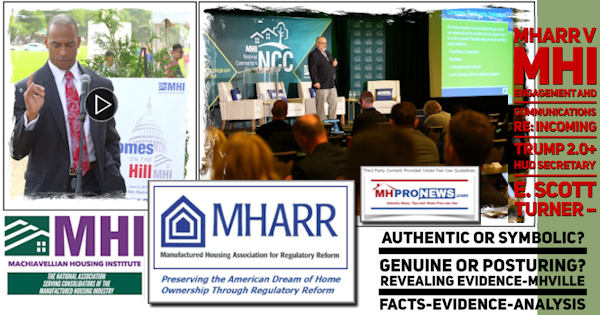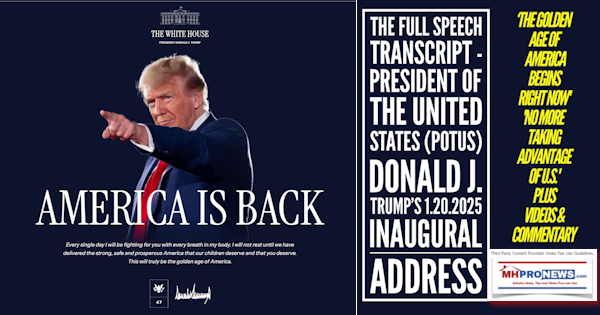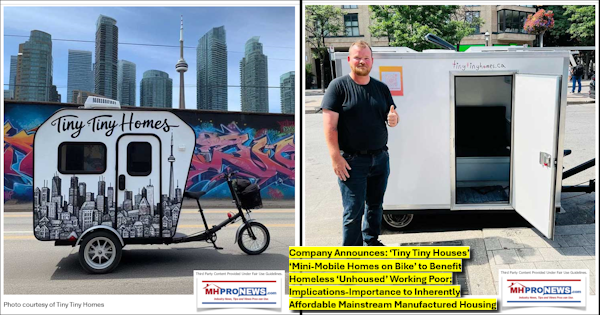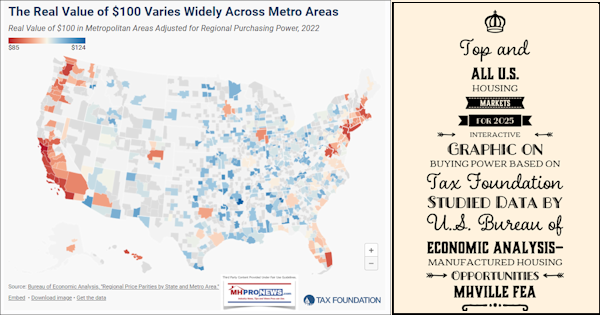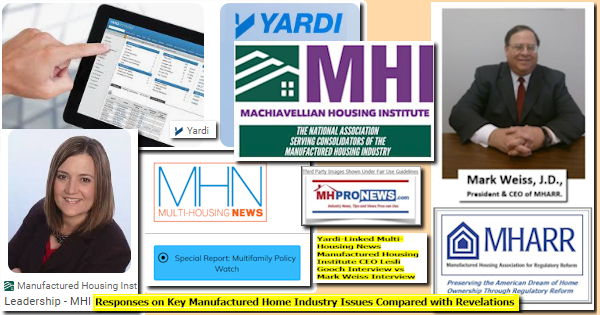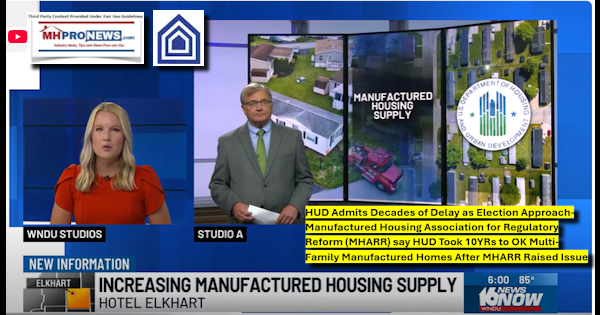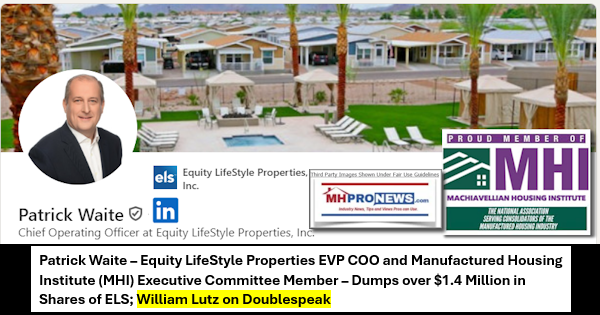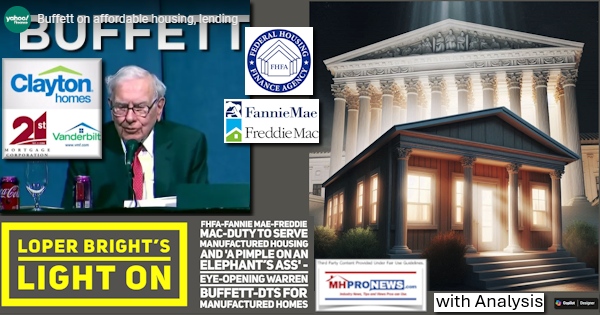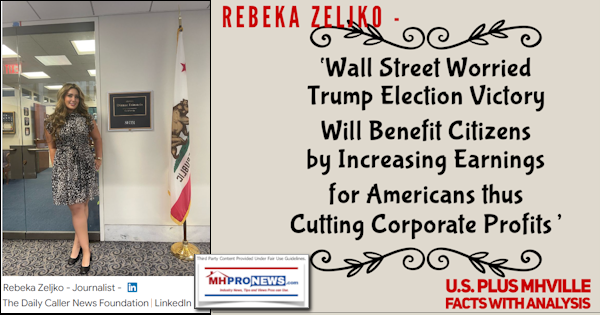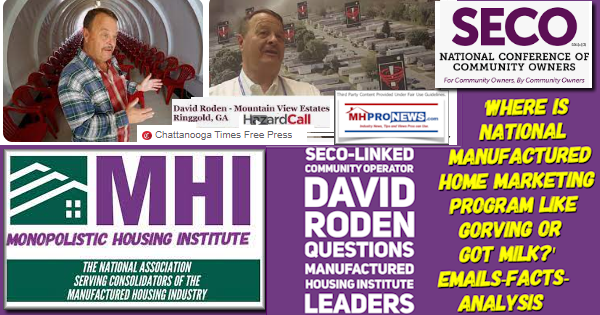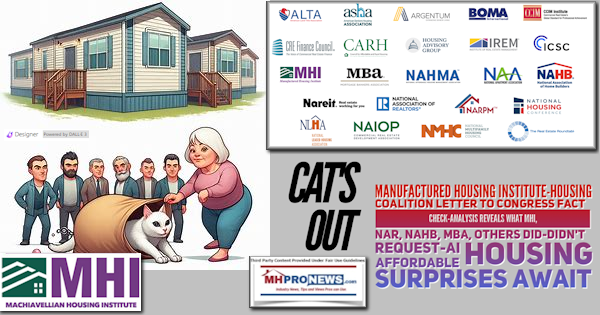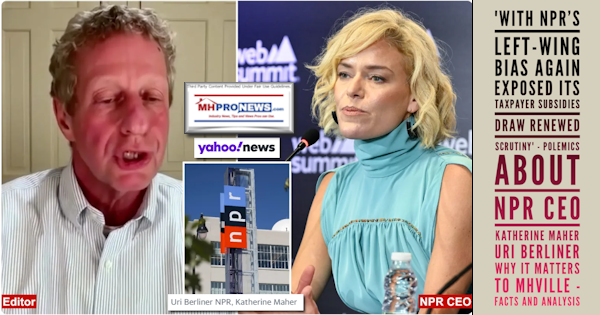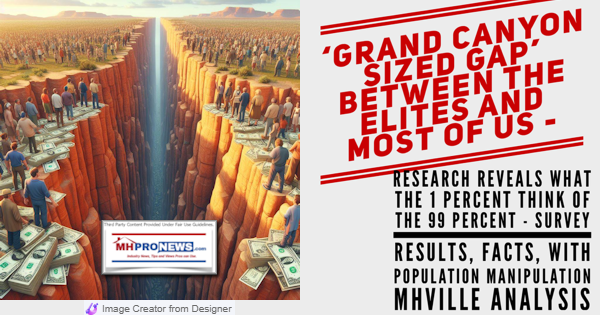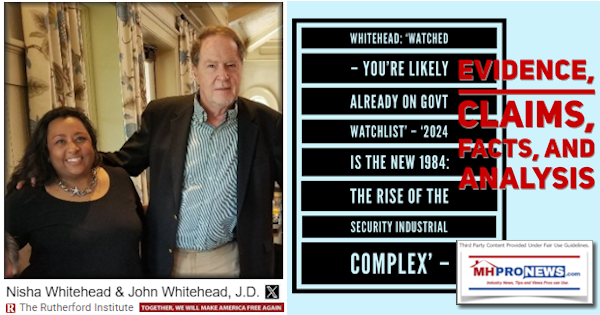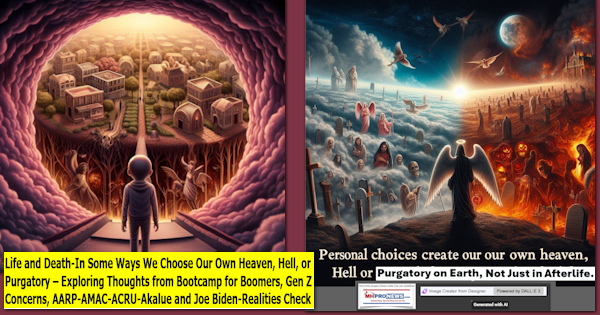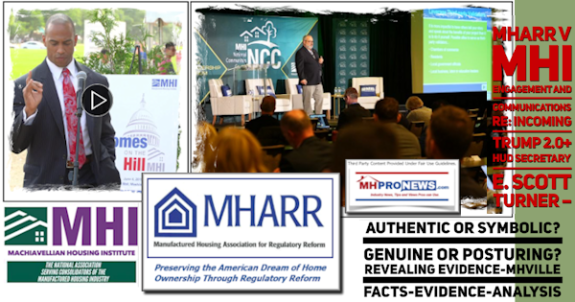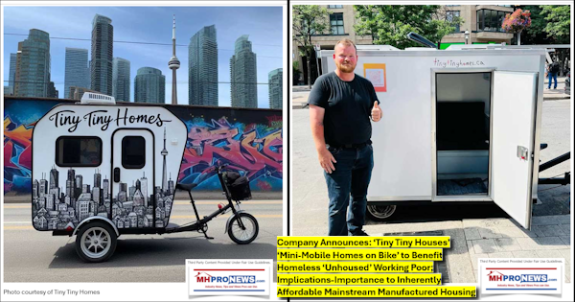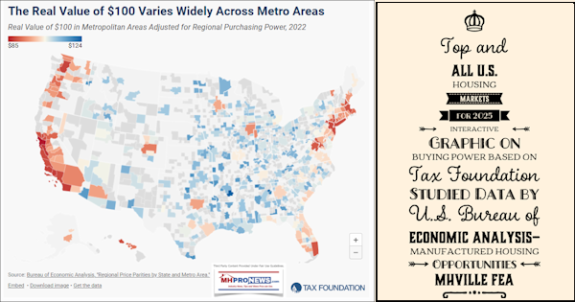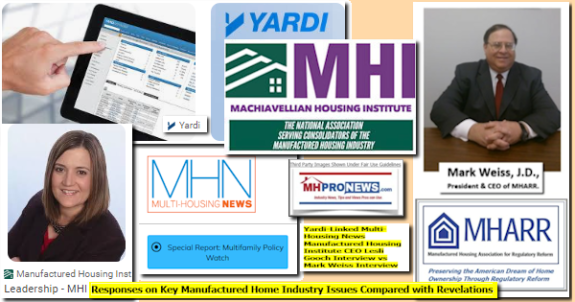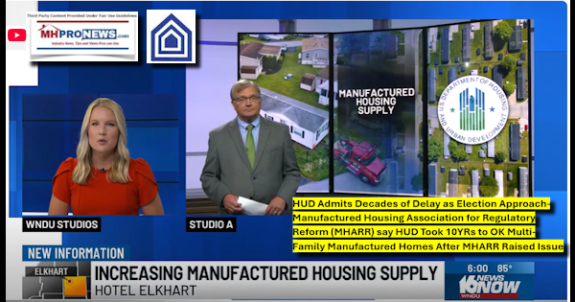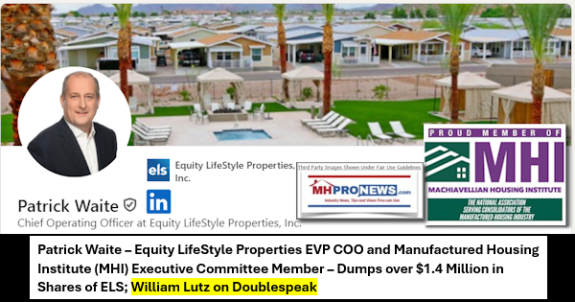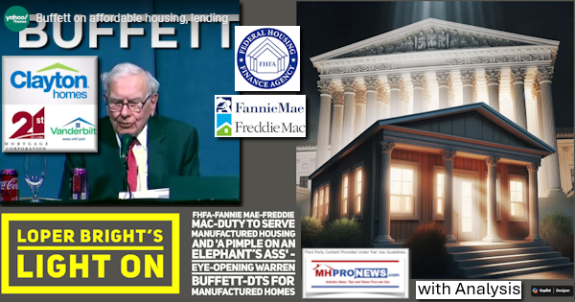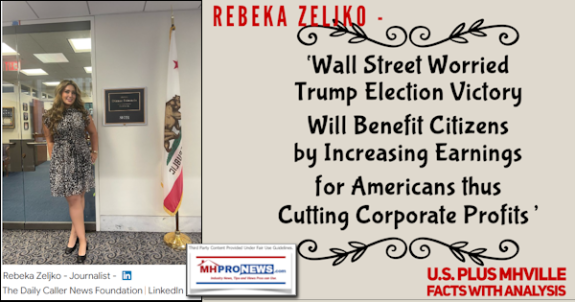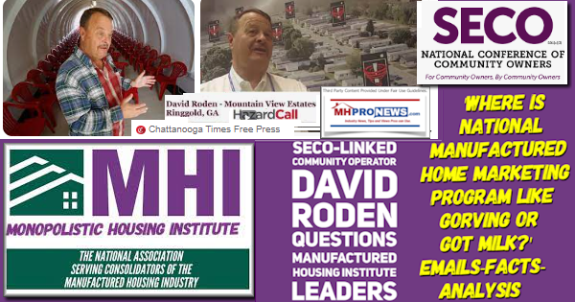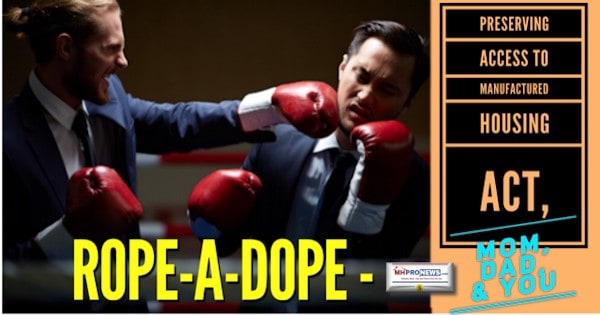
There may be no one analogy that is entirely precise enough to make the point that the promoters of the Preserving Access to Manufactured Housing Act purportedly hoped to accomplish with their bill. All analogies limp at some point, but those disclosures made, let’s begin with the ‘rope and dope metaphor’ from boxing.
Per Google and Bing:
rope-a-dope
/ˈrōpəˌdōp/
nounINFORMAL•US
- a boxing tactic of pretending to be trapped against the ropes, goading an opponent to throw tiring ineffective punches.
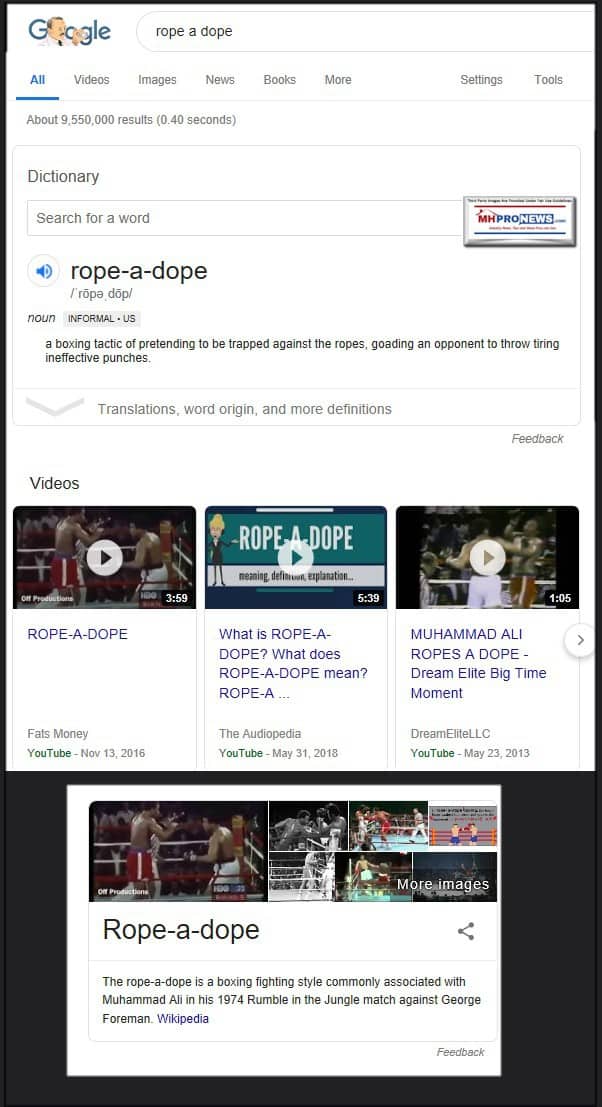
It is fair to say that most if not all of us have been wrong or misled about several things or people at various times in our lives. To make the point relevant in manufactured housing, let me hereby point the finger at my own chest, by hereby admitting to being misled myself.
In 2015 and before, this writer in word and deed supported and encouraged others to support the Preserving Access bill. While the bill was technically correct – a point that will be made further below – in hindsight, Preserving Access was doomed from the start.
In retrospection, the bill was arguably part of a hoax perpetrated on manufactured housing independent retailers, community owners, lenders, and others who supplied or provided professional services to the manufactured housing industry’s businesses. We’ll briefly make the case that the goal was to wear out marginal players, to cause them to sell out their business interests for less than the intrinsic value of their operation, and/or to fail entirely.
Rephrased, Preserving Access fostered consolidation and reduced values. To see a current left-right snapshot of that issue more broadly, consider the Daily Business News on MHProNews report posted earlier today. Senator Booker is one of several voices, on both sides of the two major party aisle, that has pointed to consolidation and monopolistic concerns.
https://www.manufacturedhomepronews.com/senator-cory-booker-we-need-a-presidentto-enforce-antitrust-laws-digging-warren-potus-trump/
In teeing up the notion that Preserving Access was a hoax, that’s not to say that it was a grand conspiracy involving scores of people. That’s not necessary, as will likewise be revealed further into this fact-check and analysis. Literally a mere handful of professionals could have arguably pulled this ploy off. The precise numbers and names – who knew what, and when – are for legal investigators to determine.
The Society of Professional Journalists (SPJ) Code of Ethical Conduct encourages several useful principles.
- SPJ says that media are to be candid about errors made by journalists,
- another is to hold the powerful to account.
- This column aims to do both, and more.
- Because not only where myself and thousands of others in our industry apparently fooled, the evidence and logic reveal that the rope-a-dope nature of the Preserving Access hoax has morphed and is ongoing. Rephrased, this isn’t one and done. It’s an ongoing ‘enterprise.’
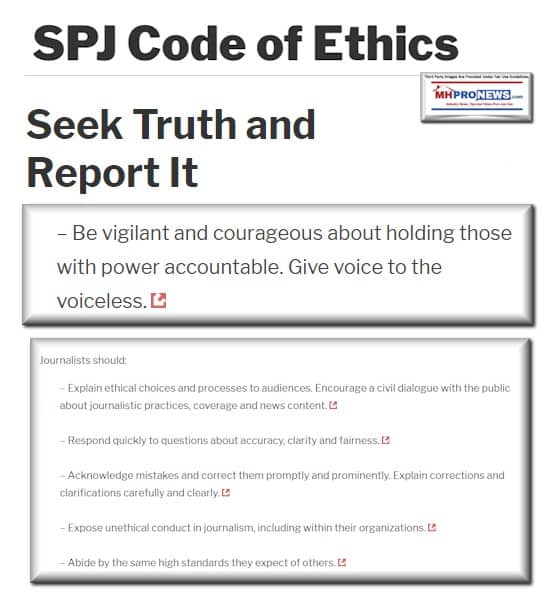
We are among the billions who believe that we are given our talents and gifts from above. There are both a healthy and unhealthy kinds of pride. Not many would say this writer lacks intelligence, so it wounds pride to to admit that I was as fooled as thousands of others were by the Preserving Access ploy. As the managing member for the parent company of this – the single largest audience in all of manufactured housing professional trade media – I’m hereby saying I’m sorry for falling into the rope-a-dope trap.
At the same time, to maintain integrity and credibility, one must lay out the facts that are known, as the realities become evident.
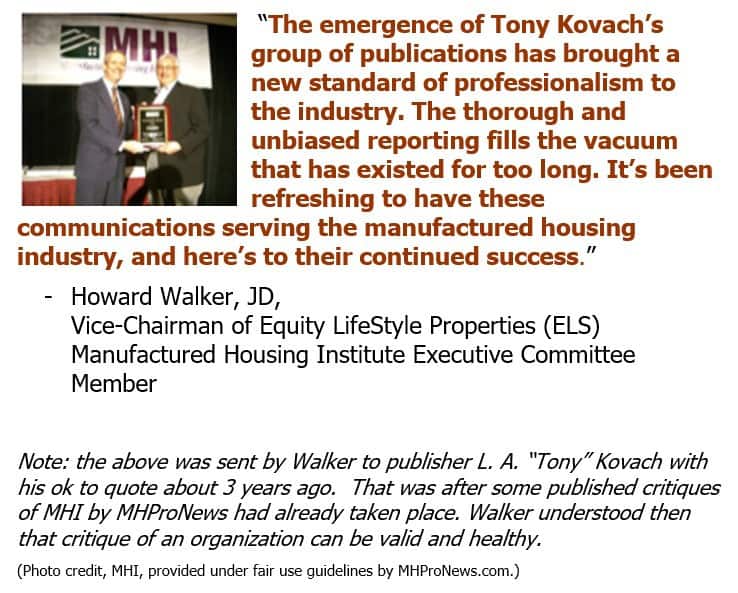
That said, it is important to explain how it occurred, why the lessons from Preserving Access still matters, and the steps useful in avoiding the ongoing usefulness of the ‘Rope-a-Dope’ to a powerful few.
Rephrased, what took place with Preserving Access arguably continues, only under a different banner. It could happen over and over, so it must be understood, exposed, and appropriate corrective measures taken to stop it from occurring again. Furthermore, those who’ve deployed this stratagem should be held to account. With that prologue, let’s look deeper.
Examples of Who Were Harmed by the ‘Rope-a-Dope’
In one of numerous state or national association meetings over the years arranged to promote Preserving Access, I vividly recall a man who had been successful for decades in the manufactured home land-lease community business. He was standing in the doorway to the association conference meeting room, returning from a break between sessions. He wasn’t a young man; rather, he was an industry ‘veteran.’
That long-successful professional had a deer-in-the-headlights look to him.
- He indicated that he cared for treated his residents fairly and that they were happy.
- That used to be part of the recipe for success in any business in America. Identify and serve a need, develop happy customers, and let them tell others, so your business can grow.
But that perplexed gentleman who owned that land-lease manufactured home community, in a fairly short period of time, watched as the business-model for his enterprise – along with tens of thousands of other manufactured home communities like his – was significantly transformed. There was a loss of thousands of independent retailers. There were fewer lending options. New regulations from the Consumer Financial Protection Bureau (CFPB) and others. Lower net-inflation/adjusted revenues was the rule for thousands of independent retailers and communities.
There were no easy fixes in sight.
That community owner was tired.
Another professional community owner that comes to mind, whom I knew better. He too fought the regulatory fights, attended the association meetings, made the move into selling homes in his communities. His firm got the new licenses, and did most of the things his state and the national umbrella association told him that he should do. But he too finally wore out, and he too sold out. He likewise grew tired of battles that for decades before previously didn’t exist.
It was just those sorts of once-successful professionals – and thousands of others like them in retail, communities, production, or you-name-it in manufactured housing – that the rope-a-dope tactic was purportedly deployed to knee cap. Consider the thousands of communities that have changed hands in recent years, as smaller operators sold out to larger ones. Wear the little man out with regulations, a lack of access to financing, or by putting out of business the retailers and factories that once supplied them.
Examining Derek Thompson’s Atlantic Report on ‘Mobile Home’ Retail Market as Fastest Dying Business In America
” At the center of a perfect storm of boomer burnout, a brutal recession, and a rapidly changing industry, the mobile home retail market could be the worst industry in America. Here’s why,” wrote Derek Thompson as his subheading on a story for the Atlantic, a popular progressive news and views website.
ICYMI, or need a reminder, the reports linked above and below in the hot-linked text-image boxes provide a sense of how many firms and how much this rope-a-dope tactic harmed independents.
Manufactured Home Community Case Study, UMH Properties, Lessons for Independent Community Owners, Investors | Manufactured and Modular Housing Industry News
For some time, but more recently in the report linked here, the Daily Business News on MHProNews has a made the point that the purported market rigging by Berkshire Hathaway brands, as referenced in reports linked here, here, and here has harmed more than just independent manufactured home ‘street retailers.’
In pondering the scheme, in hindsight, here was the obvious goal. The aim was arguably to slowly consolidate an increasing number of manufactured housing’s independently-owned operations into the hands of a few ‘big boy’ players — or drive the independents out-of-business altogether. Wear them out, and then sucker-punch them. Only the knock-out blow might come in the form of a smile, friendly handshakes, and a check at a closing table. The victims may have been paid, often thanked by their buyers, and it may not be until this moment that some who fit into this scenario will realize just how much they and others were ripped off.
That a small sense of the Rope-a-Dope in action in manufactured housing.
That was years before MHI award-winner Marty Lavin told MHProNews the following in 2018.
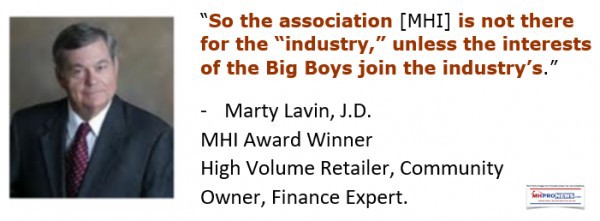
Elements of How Its Done
That outlined, let’s step back a bit more. Because there are subtle psychological forces at play that can harmfully be duplicated. Thus, this must be exposed, or the dirty tricks and related errors will continue.
With politics, associations, a church or charity, if you get someone to:
- Give time, even if it is only a little,
- Give money, even if it isn’t much,
- Take a stand, even if only briefly,
- Go to a meeting, and enjoy pleasant networking or conversations with peers,
and you are subtly training them to do that again-and-again. Why are we seeing political campaigns ask for as little as $3? It is for the reasons those bullets outlined.
Big boy companies operating in the manufactured housing segment of the affordable housing marketplace are purportedly using trade associations to do the same. It’s tragic, but one can make the case that trade groups are working against the interests of their own dues payers. Needless to say, if professionals understood that to be so, they would not normally do that of their own free will.
Congressional Efforts
That said, this writer made the correct technical arguments on issues framed by Preserving Access. I personally spoke to congressional staff and politicos from both major parties, as well as the public at large. My Congress blog post on the closely followed in Washington, D.C. The Hill website on the topic of Preserving Access was praised by Kevin Clayton, Tim Williams 21st Mortgage Corp President, CEO and then Manufactured Housing Institute Chairman, and scores of others, as the linked post below reflects.

Perhaps Kevin and Tim laughed their heads off. But time will tell who gets the last laugh.
Beyond admitting to being duped, and explaining how this ploy operated, this is an example of why on MHProNews is using the maxim, “Fool me once, shame on you. Fool me twice. Shame on me.”
It is not my intent to be fooled again. To the extent possible, we hope to utilize MHProNews and MHLivingNews to prevent as many others as possible from being fooled, while holding those who did the hoodwinking accountable. Because now having confessed my error in falling for the rope-a-dope ploy, the focus must now pivot to holding the responsible parties to account.
If there was a scheme:
- how did it occur and operate?
- Who benefited from the maneuver?
- Who was harmed?
We’ll aim at addressing each of those questions plus more herein.
How Rigging Preserving Access Was Accomplished
The system in MHVille was arguably rigged so that the Preserving Access bill would never pass at all. The truth was hiding in plain sight, and not enough of us understood that at the time. Let me stress that while some of the key players were clearly Democratic supporters, this was a bipartisan manipulation. As an independent, if I were a member of either party, I’d be incensed. Once more, let’s hold those who did the manipulating to account, rather than fall for the red-herring trick of blaming the messenger or whistleblowers.
Here are the factual elements of the rope-a-dope at work in Preserving Access.
- Warren Buffett was a prominent supporter of 2008 candidate – and later the 2012 re-election campaign of – former President Barack Obama.
- Buffett led Berkshire Hathaway has several of the largest brands in manufactured housing, including Clayton Homes, 21st Mortgage Corp, Vanderbilt Mortgage and Finance (VMF), a big stake in Wells Fargo, and ownership or stakes in several others.
- Buffett’s brands arguably dominate the Manufactured Housing Institute (MHI) along with dozens of state associations, through dues, board positions, select allies, and other forms of influence.
- Buffett – often though so-called “dark money” channels – has been a financial donor, has ties to, and/or is influential with organizations that opposed Preserving Access in word or deed. See the report with evidence and details, linked here.
The article linked below outlines the numerous voices in MHVille that raised concerns that point to specific players and their surrogates.
https://www.manufacturedhomepronews.com/joe-stegmayer-george-f-allen-manufactured-housing-institute-slogans-slump-slurs-solutions/
On the one hand, Buffett and others supported those who passed Dodd-Frank, which had onerous regulations harmful to the interests of manufactured home retailers and consumers too. That’s is why it was technically correct to support the bill, for an example, see one of several reports we published that explained why and how consumers and independents were being harmed linked here.
But as another report at that time also reflected, zoning/placement were as big or an even bigger issue. Failure to deal with that placement/zoning issue is another element in the current downturn, per the Manufactured Housing Association for Regulatory Reform.
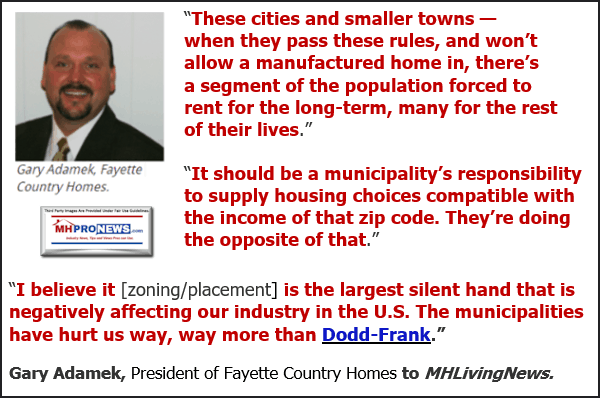
CFPB regulations harmed the industry’s independents and consumers alike, but as the above suggests, it was one of several issues that impacted the industry. Preserving Access was fueled by MHI’s leaders in a way that it was sucking up the oxygen of the bulk of the industry’s lobbying efforts.
That said, with Barack Obama pledging a veto of any change in Dodd-Frank, the hope of passing Preserving Access law was near zero. Who said? MHI’s own SVP of government relations.
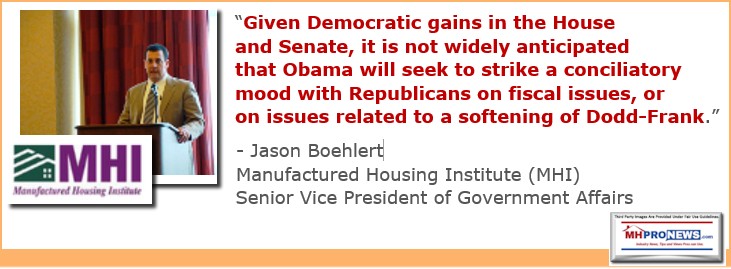
The Truth Hiding…
The panel discussion I established for the Tunica Show, where the video below was captured and later produced, was part of my evolving awakening to the farce that Preserving Access was.
In citing Frank Rolfe, it should not be construed that I’m endorsing the controversial practices of he and/or his partners. There is wheat and chaff in us all, and I firmly believe in the principle of finding the wheat and separating it from the chaff. Rolfe may arguably be wrong on several things, but on Preserving Access, he was proven to be quite correct.
Thus, Rolfe’s commentary on Preserving Access in 2016 was and still is useful.
So too were the insights shared by Bob Crawford, the President of famous Dick Moore Housing, one of the oldest and highest performing retailers in all of manufactured housing history. Dick Moore’s business has a fine A+ Better Business Bureau (BBB) rating. He has owned retail centers and land-lease manufactured home communities, which some errantly call ‘mobile home parks.’ With that introduction, here’s the video.
MHI’s Chairman Tim Williams, per state association sources, exercised raw power over numbers of state executives in mobilizing them to support Preserving Access. See the report, linked below. Williams pushed state executives into supporting the 21st/Clayton and Manufactured Housing Institute (MHI) promoted legislation, even though many execs had concerns about its viability.
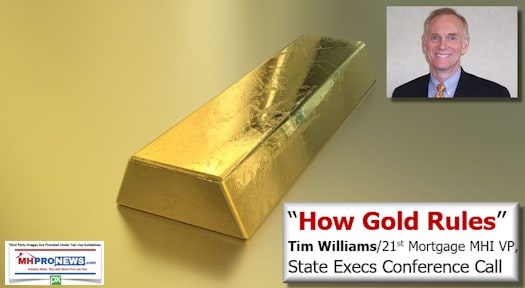
For several years, millions of dollars were spent in the effort to supposedly get Preserving Access passed. Meanwhile, problems of local zoning, issues at HUD, or other concerns festered. As manufactured housing industry success story Gary Adamek and others put it, zoning was a far more vexing issue. Adamek wasn’t alone.
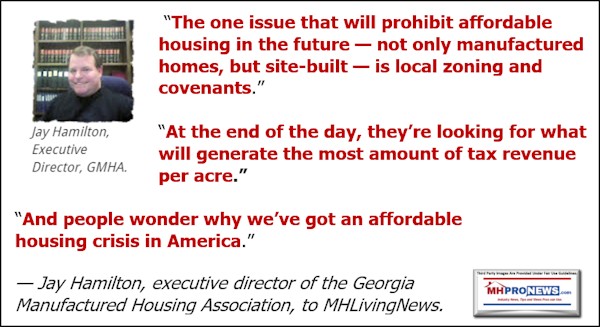
Despite the assurances of Nathan Smith, MHI’s prior Chairman to Williams, that the industry – often a euphemism for MHI – would be more pro-active instead of reactive, MHI in hindsight emphasized Preserving Access so much, that other issues arguably slipped. It was as if MHI could only chew gum but couldn’t walk or talk on other pressing or festering issues.
The point is that Buffett and a few key people had arguably rigged the system in a way Preserving Access would never pass. Yet MHI continued to pursue it.
That disconnect should have been obvious to MHI. Indeed, as was noted above, it was MHI’s SVP in charge of government-relations Jason Boehlert said as much in 2012. Yet for four more years, MHI pursued a hopeless bill?
That begs the question, why did MHI continue to pursue a plan that was a dead end?
Seen through the lens of rope-a-dope, a plausible picture emerges. It was done to foster the consolidation of more businesses into fewer hands, and/or drive more competitors out of business.
That concern raises other problematic issues, such as this. Is MHI’s leadership so corrupted that the Arlington, VA based trade group has and continues to deceived hundreds of their own members? As the evidence began to reveal itself, what to do?
Mom and Dad
It’s Mother’s Day as I’m drafting this article. My mother and father were both intelligent, well educated, informed people. They survived the Nazi occupation of Hungary. They lived in the shadow of Soviet Russia for years before that tumultuous time. When the Soviet Union’s brutal armies were pressing into Eastern Europe near the end of World War II, my parents abandoned virtually everything, took their children, and fled West to the Allied lines. They endured harrowing experiences in that trek. They finally made it to an American controlled zone. They spent years in a Displaced Persons, or DP Camp, educating others. After years of waiting after they applied to come to America, they were sponsored into the U.S., where I became the first of my parents 7 children to be born in the USA.
Two of my siblings didn’t survive the war, what my parents went through was that bad. That speaks volumes, as does what follows.
My parents faced life and death decisions. They did what they could under difficult circumstances in an enemy occupied land. Intelligent, motivated – yet they still learned only later how official deceptions – such as how the war was going for the Nazis – were just that, lies. Propaganda. Hold that thought.
When they came to the U.S., the civil rights movement was on. My parents were known supporters of civil rights for all. Later, when pro-communist speakers came to campus, they went to publicly dispute the false communist claims.
My father was a university professor. Years after the war, he returned to Europe and was the first Ph.D. to earn his doctoral degree in philosophy “summa cum laude” – with highest honors – in the five century history of the respected University of Cologne. My parents sacrificed as a couple so my father could return to Europe to earn that degree, and thereby make a better life for his family, while teaching others too.
During the Nazi occupation, my father had a minor governmental position. Reflecting on WWII and the Nazi occupation, several points he and my mother shared stand out. One, while Christians, they secretly helped feed hungry Jews during the Nazi occupation, at their own peril. Two, my parents said that while they knew the population was being propagandized, it wasn’t until after the war that they realized how extensive the Nazi propaganda was.
The point is that even highly intelligent people can be deceived, but once a deception is grasped, the moral thing to do is right the wrong as best as one’s station in life allows. They also demonstrated that you do the best you can, based on what you know and can do.
We each learn from a variety of things. Ultimately, in the natural order – meaning apart from Divine intervention – learning comes down to just two prime sources. We learn from the experiences of others, and we learn from our own experiences.
Books, articles, teaching, videos, discussions, or other forms of learning are the related experiences of others. The simplest child can teach us something, if we are open to it, while one learns from the most profound wisdom of the greatest minds of all time.
Looking back to 2016 and that Tunica Manufactured Housing Show panel discussion, Frank Rolfe – however controversial he may be, and however much I disagree with some of his terminology, etc. – taught me something valuable. Bob Crawford did too.
Tim Williams and MHI President Richard ‘Dick’ Jennison taught me as well, albeit in an oblique fashion. In hindsight, Williams and Jennison revealed parts of the game in manufactured housing has been played. At the time, it made no sense, in hindsight – with the rope-a-dope in mind – the ploy and what it was used have become quite clear.
Manipulating others becomes easier, given certain dynamics. Get a group going in a certain direction, and momentum makes it easier to keep them going that way. Busy independent business people don’t have time to dig under the surface. That’s why they pay a trade organization.
Independents trusting MHI or other weaponized trade groups has purportedly been part of the rope-a-dope scheme. There is in hindsight, as Mark Weiss, JD, President and CEO of the Manufactured Housing Association for Regulatory Reform, an ‘Illusion of Motion.’ That illusion of activity – that MHI claims is to improve the industry – is enough to fool busy professionals that trusted the Arlington, VA based MHI trade group, while their members are focused on their business.
“The Illusion of Motion Versus Real-World Challenges” | Manufactured Housing Association Regulatory Reform
Motion – or, more accurately, activity – in and of itself, is not necessarily synonymous with, or equivalent to, realprogress, or, in fact, any progress at all.
Not only for this writer, but for others in manufactured housing, the evidence of in hindsight of deception by leaders connected to MHI began to crop up. One big clue was an email from MHI to its own members, shown below in its entirety. A source in MHI’s organization told me that the “Housing Alert” – shown below under fair use guidelines – were only giving part of the story about a Senate hearing on Preserving Access between Senator Joe Donnelly and the CFPB Director Richard Cordray. Rephrased, that source claimed MHI was at best giving their members a half-truth. Going to the CSPAN video, that MHI source proved correct.
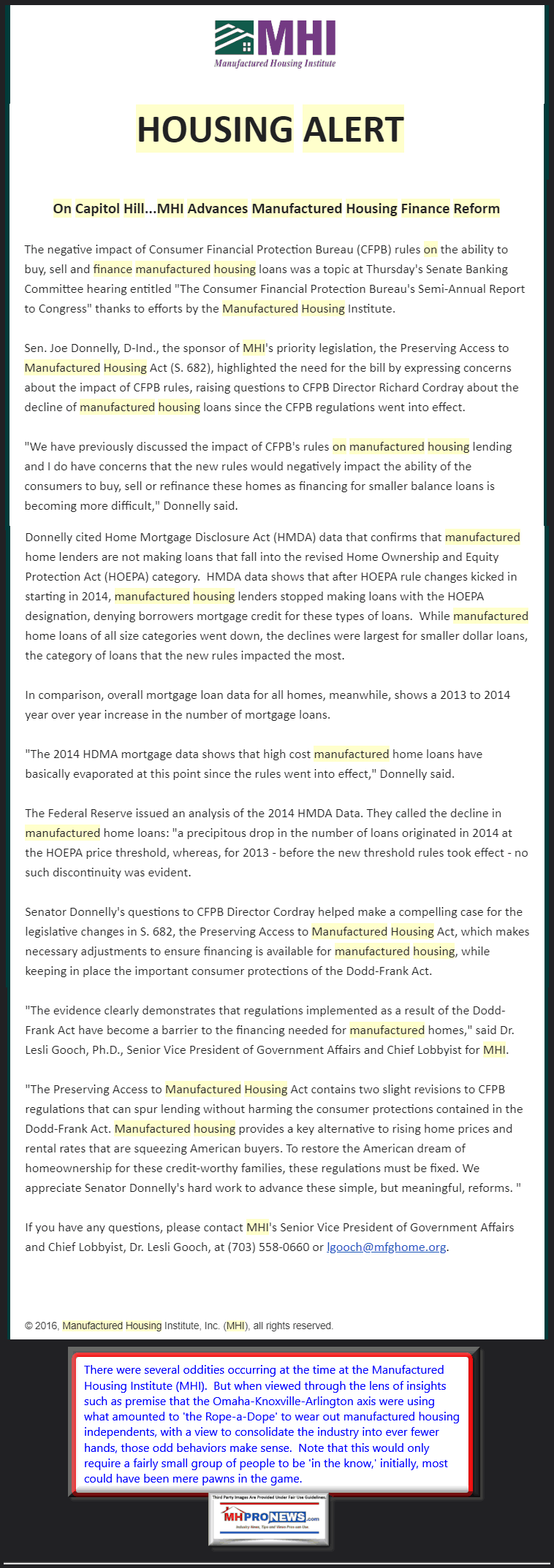
We produced the following video – shown a few paragraphs below – during that time-frame. But frankly, the full meaning of what occurred only become clear in the rear view mirror, years after these events referenced by MHI’s message.
Let’s note, Senator Donnelly or Director Cordray may have been oblivious to what was occurring. MHI no doubt provided Donnelly with certain questions, they indicated as much at the time. Nevertheless, Donnelly or Cordray could well have been obvious to the fact that each were playing a part in a costly and harmful drama. If Donnelly and Cordray were figures in a staged play, they should desire a federal investigation into these events as much as tens of thousands of industry professionals should want it.
MHI’s Senior Vice President Lesli Gooch, Ph.D. sent that message, as the email above indicates. It was obviously with MHI President Richard ‘Dick’ Jennison’s okay. As such MHI “Housing Alerts” were sent to their own members. Because affiliated state associations would resend MHI messages, this kind of ‘alert’ was distributed to thousands of others in manufactured housing. The quotes used by MHI were accurate, but they were a half-truth. It was arguably meant to deceive, as their own headline indicates:
“On Capitol Hill…MHI Advances Manufactured Housing Finance Reform.”
There was no advance of Preserving Access. Barring Barack Obama and the U.S. Senate acting against their stated positions, no advance was possible. The bill never, ever passed into law. How could it?
MHI’s omissions changed the entire tenor of the Cordray-Donnelly Senate hearing discussion. That’s arguably why that MHI source sent us the tip at that time; that insider source wanted us to know that MHI was telling a half-truth that had so much spin, that it was arguably a lie.
Once more, at that moment in time, I still didn’t get it that Preserving Access was a rope-a-dope head fake. But I knew that morally, it was wrong to deceive their own members. The why behind the deception took time to uncover.
So, about 3 years ago – based on what looked like clear evidence of deception of their own members – this writer publicly called for the resignation or termination of Richard ‘Dick’ Jennison and Lesli Gooch, Ph.D. Not knowing more at the point in time, there was nothing more that could be done.
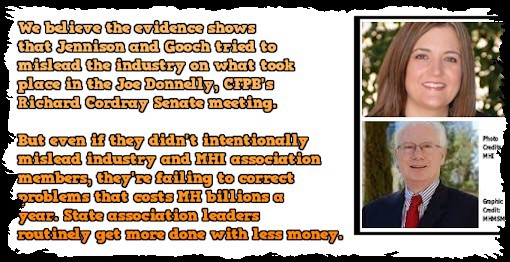
That said, their deceptions made me look deeper, and ask, why wasn’t MHI using the best arguments with the CFPB and Richard Cordray?
Still supporting the logic of the bill, while opposing the tactics being used, our operation paid for the following production.
As this writer acknowledged in a Clayton Homes related report, linked here, our videographer wasn’t the greatest. That’s my bad, for not doing a better review of that person’s claimed credentials. That said, the videos he produced are useful. Perhaps videos and articles we produced at the time are more useful today in hindsight, then they were at that time.
Our graphics and videos have improved since. But at a minimum, what we produced should have inspired MHI to do something similar and better. They had the budget and they had the responsibility for advancing their own agenda.
With those disclaimers and logical points, we made this summary of statements made by CFPB Director Cordray to Senator Donnelley (D-IN). Those pull quotes were and are revealing. Because not only were Gooch and Jennison failing to be honest about the breadth of discussion at that Senate hearing, but MHI was also failing to use their best arguments. Why didn’t they take Cordray’s own logic, and show him why Preserving Access could and should be done by Cordray by agreement? After all, Cordray had that authority to change CFPB regulations himself.
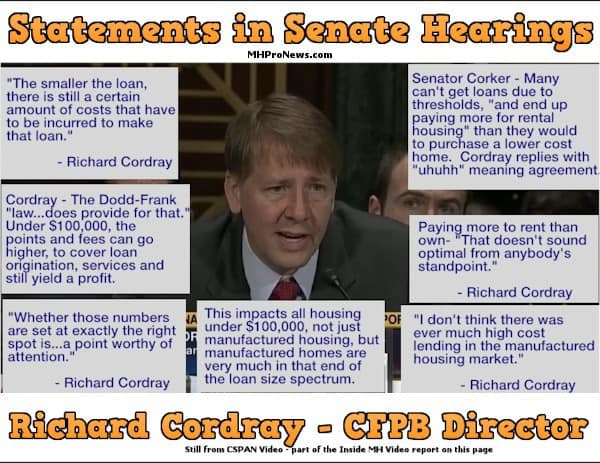
Rephrased, if MHI’s leadership were serious about getting their bill passed – or the actual intent of the measure was to get Cordray to relent and place the same regulations into effect – then why didn’t they do some similar or better efforts to what we provided our readers and viewers?
Or even easier for them, why didn’t MHI actively support and promote our efforts to help them pass their measure – given that we were MHI members, and that we were promoting what they say they wanted?
Bear in mind, that MHI’s then chairman praised this writer, and our publications. He did so precisely in the context of thanking us for our support of Preserving Access. The disconnects with MHI’s actions where all over, but it they only became clear in hindsight.
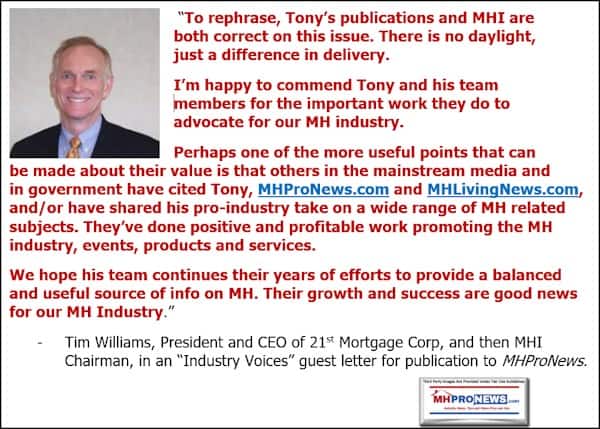
Do you see how the logic and evidence that MHI leaders were shadow boxing, playing rope-a-dope, mounts in the enhanced clarity of the rear-view mirror?
What Then MHI Chairman Tim Williams Did
As the linked report documents, MHProNews and I personally had called Jennison and Gooch out for their deception publicly. Tim Williams response? Williams backed them after their apparent deception was revealed.
At a subsequent MHI meeting, Williams held a vote of confidence, which given ‘how gold rules‘ of course passed, in favor of Jennison.
These events took place in the view of thousands of readers, and dozens of MHI member event attendees. Bear in mind that Williams, Jennison, and others had long praised our work. Of course, for a time, we were useful to them. Ouch, if so, but there it is. However one looks at it, what looks bad is that the perpetrators of these deeds were arguably part of a purported fraud.
Yes, not just deception, but fraud is a plausible argument.
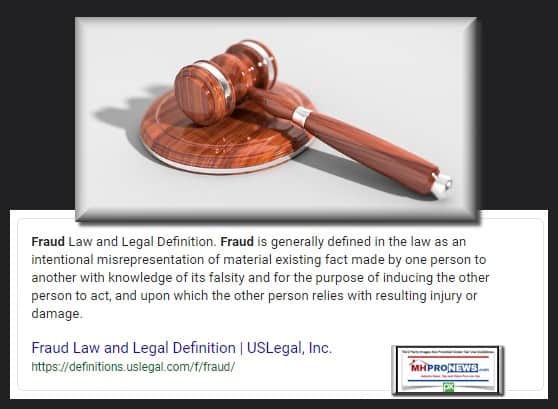
Given that MHI’s efforts were ‘ongoing,’ used ‘the wires’ – i.e.: the internet, and the U.S. mails too, that can all be elements of RICO. “Racketeer Influenced and Corrupt Organizations Act (RICO) is a U.S. federal statute which provides criminal penalties and civil action for any act performed as a part of an ongoing criminal organization,” per US Legal.
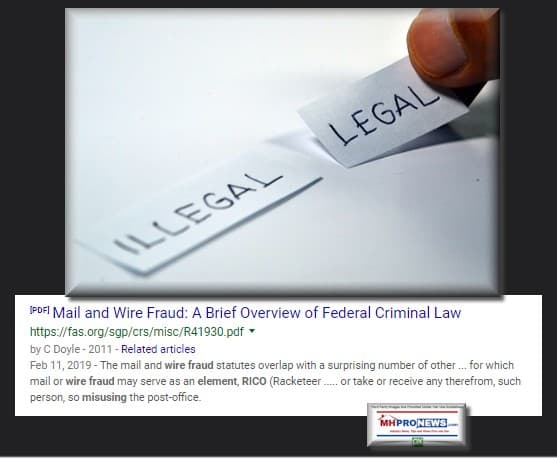
Once more, at that time, RICO or fraud were not on my mind. But in hindsight, there is an argument to be made that those who’ve participated in this alleged fraud could be subject to federal, state, and civil actions.
That noted, let’s flash back again.
 The Williams ‘vote of confidence’ and related fueled my interest in peeling back the layers of the onion.
The Williams ‘vote of confidence’ and related fueled my interest in peeling back the layers of the onion.
I won’t go into much more, other than to say that there were numerous voices inside and outside of MHI that helped me arrive at the point that I am today. At the time, I was so behind Preserving Access, that I pressed MHARR to support the bill. They calmly told me that if anyone called, they said they were for the goal of the measure, meaning more access to more lending. But MHARR’s leaders apparently had a better sense that the bill was going nowhere, no matter how many meetings MHI held, or how many emails they sent out to the industry.
That noted, let’s pivot to a related point to the issue of consolidation.
For example, a source provided MHProNews with documents in 2017 that reflected an apparent violation of antitrust law, aimed at eliminating independent retailers and others they did business with. Put differently, this was a more active move vs. the more passive ‘rope-a-dope’ ply. The evidence provided us involved letters from 21st Mortgage’s Tim Williams. That caused us to research what Kevin Clayton at Clayton Homes, and Warren Buffett at Berkshire Hathaway said during that same timeframe. The documents, direct quotes, and video linked below are perhaps the definitive report on that topic to date.
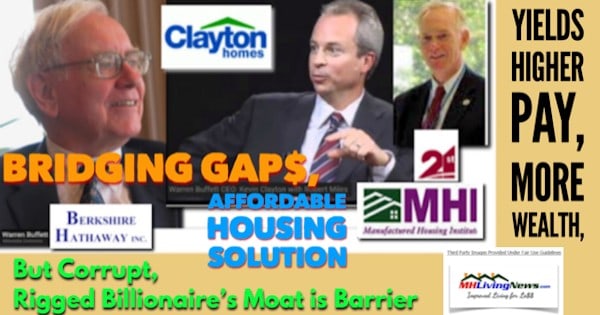
We’ve asked Clayton, 21st, and MHI leaders to respond to these concerns several times. Silence. They’ve not confirmed or denied the allegations of market rigging done in a fashion that is arguably a violation of antitrust laws. If they rigged the market in bold ways, why not in more subtle ones?
What Does This Mean For Investors and Manufactured Housing Professionals?
What Does This Evidence Mean for Affordable Housing Advocates?
First, this pattern of behavior took place over a period of years.
Second, while experts on the topic are useful, the elements of the case are laid out from this report.
Third, while we believe the evidence and its elements are compelling, the accused are deemed innocent until proven guilty in a court of law, or by a plea/settlement. These are allegations at this point, although they are arguably logical points with solid evidence and patterns of activity provided herein.
Fourth, this arguably impacts virtually every independent business, not to mention, home owners, workers, investors, home seekers, and tax payers. The economic harm is in the billions annually.
Fifth, initially, some of these players – for example, Richard Jennison or Lesli Gooch – could well have been mere pawns initially. They may at first only have been following orders. But as certainly, as we published various fact-checks, analysis, and research, it becomes harder for them to argue that they lacked knowledge. That’s problematic for them, if legal action occurs, unless they use their insights to flip against those who pulled their strings and ordered various actions. It should be stressed that sources at MHI have already provided MHProNews with useful information that helped unpeel layers of the onion.
Sixth, several state association executives arguably have a similar problem at Jennison and Gooch have. Some of those executives publicly praised our work, and they praised that letter to the Hill that this author published. Once more, similar to Jennison, some state executives may have begun as mere pawns. But with MHI staff or state association staff, there is evidence that they are routine readers. Their own emails to others will reflect their knowledge. Failure to report a crime can lead to a charge of being an accomplice after the fact. It should be noted that state execs are among our sources for tips. When the time comes, we can testify on behalf of those that did what they could to battle the corruption, through their news tips.

Seventh, while legislators often support bills and make speeches in favor of legislation that they know will go nowhere, that is arguably different than being part of a fraudulent scheme. For 2020 and other motivations, legislators and other advocates may be motivated to do what is right with respect to the Rope-a-Dope and related schemes to consolidate manufactured housing into ever fewer hands.
Eighth, as some linked articles reveal, there may likewise be connections between non-profits that benefited from Warren Buffett’s largess – directly or obliquely – that these same numbered points apply to from a legal perspective. One may begin innocently as a mere tool or pawn in a fraud. But as realization hits, there are legal and more reasons for them to step forward.
Ninth, advocates and unelected public officials also have a role in acting as they digest this.
Certainly, once an allegation is made, evidence is presented, and reason is applied, a reader can and should double- check the claims. We don’t ask that any of this be taken on blind faith. I’ve routinely invited key people in the Omaha-Knoxville-Arlington axis to debunk or explain away previous reports, some of which are linked in this one. In the past two years, they’ve largely been mute directly. Indirectly, they’ve arguably taken several steps, including hiring an outside attorney for MHI to threaten this writer and our publication. If we were mistaken, why didn’t they simply point out our fact error or any misstep in reasoning? Instead, MHI used threats and other tactics.
Lanham Act, Monopolistic Housing Institute, err, Manufactured Housing Institute, Legal Bullies, and You
Attorneys learn to think systematically. So too do engineers, philosophers, mathematicians, MDs, and other scientists. Ideally, attorneys and other thinkers consider not only their own position, but other perspectives too. The better an attorney understands their opponent’s argument(s), the more effective they can be in representing their client’s interests.
This writer has already taken certain steps with state and federal officials, and will plan to take others. So while this is a mea culpa, it is more.
Tenth, one or more individuals in this circle have purportedly misused the mails in an effort to threaten and/or embarrass this writer via a form of extortion. They perhaps didn’t realize that every such step only confirmed that we were on the right track. As our team or myself have said before, sure, there are some things that would be embarrassing for me, but it could be explained in 60 seconds. There’s a keen difference between an embarrassing moment, vs. fraudulent or criminal activity.
Why would someone engage in such a fraud and use the ‘rope-a-dope?’
Let’s let Warren Buffett help us explain the answer to that question.
How Warren Buffett Sheds Light On This Issue
Hindsight isn’t always 20/20. But Buffett, whom I disagree with numerous points of his purported business or other (lack of) ethical practices, has nevertheless said some things that were useful to me in understanding what occurred and why.
Paraphrasing the Oracle of Omaha:
- The rear-view mirror is clearer than the windshield.
- The lesson of history is that most don’t learn the lesson of history.
- If you take a long view of an investment in an industry, you can do more than those who only take the short view.
- Buffett stresses that he only invested in industries that make good sense. That was confirmation of the value proposition of manufactured housing.
- Reputation is important.
But oddly, Clayton and their related lenders have behaved in ways that arguably stoked problematic reputational issues. ICYMI, or to see the connections, please check out the related report, linked below.
Clayton Homes, 21st Mortgage Corp, Vanderbilt Mortgage and Finance – Investor Lessons Learned | Manufactured and Modular Housing Industry News
The past is prologue ideally to be learned from. When an error is made, it could be ignored, covered up, or deflected by some razzle-dazzle style head-fake. Or an error can be admitted, addressed, amends made as possible, and then one can advance with head held high. The Daily Business …
In hindsight, looking at the evidence, the case can be made that Buffett had the goal of monopolizing a big part of the industry.
Buffett did so by manipulation of access to financing and capital. This is a realm where the advocacy of the Manufactured Housing Association for Regulatory Reform (MHARR) was useful to me and others in the industry. The Duty to Serve (DTS) Manufactured Housing by the Government Sponsored Enterprises (GSEs) of Fannie Mae and Freddie Mac became law in the Housing and Economic Recovery Act of 2008 (HERA), a measure MHARR successfully backed.
But a decade later it is still not being fully or properly implemented. What can that lack of implementation be traced back to? MHARR has argued that fingers point to GSE foot dragging, Berkshire Hathaway lender’s that de facto foiled its earlier implementation, and MHI working to re-direct DTS to an untested and more expensive so-called ‘new class of homes’ built under the HUD Code.
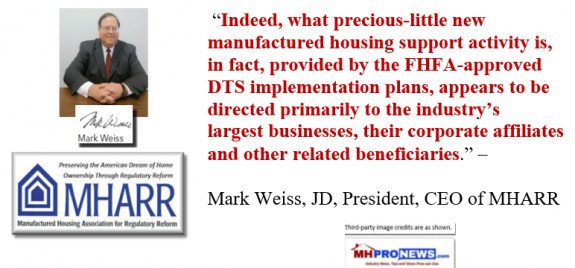
Buffett and his fellows in MHVille, in hindsight, has been both revealing and concealing.
What’s arguably occurred is often done in plain sight. If someone had checked the records as we have, they could have come to the same or similar conclusions. Buffett’s merry band of leaders in MHVille have purportedly played rope-a-dope for years. Thus, the ongoing nature of this matter, which is why RICO – IMHO – can and should be applied.
Cutting off lending to thousands of retailers who didn’t buy Clayton products harmed many, causing numbers to fail. That in turn tipped some factories out of business or caused them to sell out later at a discount. It also harmed independently owned manufactured home communities, that for decades counted on retailers to fill their vacant sites. So much changed after the events in this linked report.
More recently, Buffett’s money apparently funded the underlying research used by Oliver’s video, linked here.
These are arguably slow-motion methods of getting ‘undervalued acquisitions,’ and do so in a manner that could easily elude federal antitrust regulators and/or their victims.
The linked reports are crucial for grasping the evidence of how this purported plot has been carried out. Let me stress that initially, only a few would have had to know. But as our reporting has unpeeled the layers, plausible deniability has slowly escaped their various tools and pawns, as those individuals have gained understanding of the elements of the ploy.
Ronald Reagan said his 80 percent friends are not 20 percent enemies. That’s an important principle in manufactured housing for those NOT in on the rope-a-dope. There have been useful tips from past and present MHI staff and members, MHARR leaders and their members, independents, or others who have since broken with MHI as the rope-a-dope became clearer to them. I’d like to think we’ve been helping each other against the threat of still more costly market manipulation.
HUD Secretary Ben Carson has arguably done the industry a big favor in his recent statement. See that, linked below. Ask yourself, why doesn’t MHI have the entire speech on their website? Once more, just before publishing this, we’ve verified that this isn’t on their website. Are they that lazy and incompetent? I’d say, no. So, is there something else – like the illusion of motion and the rope-a-dope – at work at MHI
Dr. Ben Carson Secretary of Housing and Urban Development Manufactured Housing Conference Remarks New Orleans, Louisiana, Hyatt Regency Hotel, May 7, 2019 | Manufactured and Modular Housing Industry News
This evening, as this report is being prepared, there are two, and only two places online that we can discern where someone can find the entire address by HUD Secretary Ben Carson, M.D., to the Manufactured Housing Institute (MHI) at their meeting earlier this week in New Orleans. You …
Imagine a candidate pondering replacing MHI president Dick Jennison, other than say Lesli Gooch. Imagine that a candidate uncovers a report like this. Who would want to go work for an organization that one of their own prior presidents effectively dissed as he exited? Who would want to fill the role of an allegedly corrupt organization?
- There is evidence that supports the reality that MHI has been shadow boxing as well playing rope-a-dope.
- Buffett has demonstrably been funding opposition to manufactured housing interests, including Preserving Access.
- The industry’s members were getting purported propaganda, spin, and weaponized half-truths directly from MHI and indirectly from state associations.
- More recently, weaponized information has come from a new publication launched that largely is a purported MHI propaganda tool, aptly named MHInsider. Berkshire brands and others who are benefiting from consolidation are among their sponsors. MHInsider isn’t alone, consider the head fakes from purported pawn and rewarded surrogate, George F. Allen. For still more, see the below.
B2B Statistics, Trends 2019 – April 2019 Snapshot of Manufactured Home Professional Readers | Manufactured and Modular Housing Industry News
Research compiled from several sources as reported by Get Codeless yielded the following bullets about blogging trends and related business to business (B2B) marketing data. The importance of their factoids will be more apparent further below. Latest Blogging Statistics and Trends in 2019: The average blog post length …
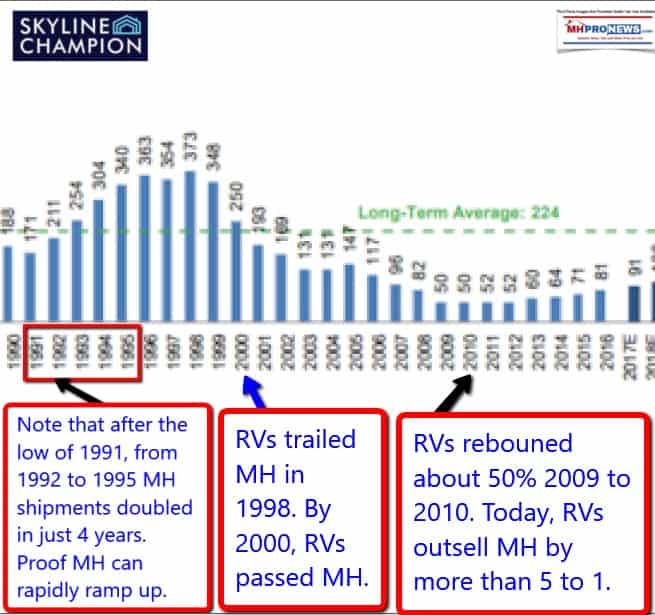
How Manufactured Housing Has Been Manipulated and Stunted During an Affordable Housing Crisis
There are at least 4 principles that have been at work.
- The power to tax is the power to undermine value and potentially to destroy a business or industry.
- The power to regulate is the power to destroy.
- The power to manipulate, limit, or cut off capital and financing is the power to undermine or destroy a business’ value.
- Last for now, but not least. The ability to artificially generate opposition in media, politically, and otherwise can limit, undermine, and destroy a business’ value or potential.
Buffett’s donations can be traced to a nonprofit called MHAction. MHAction was part of a group of three nonprofits that did a white paper on problematic business practices by manufactured housing brands that provided key material in Last Week Tonight with John Oliver’s viral and errantly named “Mobile Homes” video. That video attacks Buffett’s own companies.
But so too did the Center for Integrity, whose journalist co-authored the first Seattle Times attack on Clayton, their lenders, and de facto the Preserving Access bill. Buffett’s money found its way to that nonprofit too. See the third-party research, linked here or above.
So, there is an ongoing pattern of activity. This is why we believe that their is a case for RICO, fraud, as well as antitrust.
Summary
We are left with a picture of Buffett and his key henchmen in MHVille apparently playing rope-a-dope with the industry. Initially, only a few people had to be involved in the sense of being ‘in the know.’ Later, plausible deniability arguably faded for certain people, say MHI key staff, as our reports on the issues became more focused.
There’s more evidence to unpack in related reports linked from this one. But the essential points are undisputed at this point by Clayton, 21st, VMF, MHI, and that MHI outside attorney – all of whom have been directly asked and asked again to respond to the evidence, concerns, and allegations. They have the right to remain silent.
Perhaps they have no good response to the evidence?
Freedom isn’t free. My parents taught me that me that in word and deed. You resist and fight back any way you can, based upon your circumstances in life.
Economic freedom is as important as free speech, free assembly, the right to vote, and so on.
Antitrust, RICO, and other federal or state corrupt practices investigations must be made and done as publicly as possible so as to deter others from such ploys.
Millions of lives have arguably been impacted, using Secretary Carson’s logic. Tens to hundreds of billions of dollars a year are arguably being lost in our industry, with a ripple effect in the country that makes the total economic harm far worse.
Preserving Access to Manufactured Housing Act – under this premise – was a head fake, and the record is now being set straight. My apologies for not seeing it earlier. Now, help us help you be sharing this with others, and then acting accordingly.
That’s a lot to digest. But by laying it out, step-by-step, dotting i’s and crossing t’s, and linking the evidence, it provides those looking in and those within the industry to follow the evidence. That is the start of fixing what has artificially suppressed manufactured housing. See the related reports below. “We Provide, You Decide.” © ## (News, commentary, fact-checks, and analysis.)
(See Related Reports, further below. Text/image boxes often are hot-linked to other reports that can be access by clicking on them. Third-party images and content are provided under fair use guidelines.)
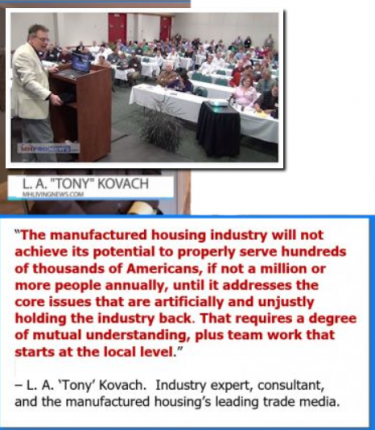 By L.A. “Tony” Kovach – for MHProNews.com.
By L.A. “Tony” Kovach – for MHProNews.com.
Tony is the multiple award-winning managing member of LifeStyle Factory Homes, LLC, the parent company to MHProNews, and MHLivingNews.com.
Office 863-213-4090 |Connect on LinkedIn:
http://www.linkedin.com/in/latonykovach
Sign Up Today!
Click here to sign up in 5 seconds for the manufactured home industry’s leading – and still growing – emailed headline news updates.
Related References:
The text/image boxes below are linked to other reports, which an be accessed by clicking on them.
Ross Kinzler Confirms Allegations, MHEC Peer Claims “Association Malpractice;” Member Backstab, MHI Failure Concerns
There are several hot-button issues that are circulating in manufactured housing. They include, but are not limited to, the following. The failure of the Manufactured Housing Institute (MHI) to respond to the Bryan, TX “ban” and limitations places on new or pre-owned manufactured housing .
“Lead, Follow … Or Get Out of The Way” | Manufactured Housing Association Regulatory Reform
The last decade-plus has not been especially kind to the manufactured housing industry and consumers of affordable housing. The 21 stCentury began with a great deal of promise for the industry and consumers alike.
HUD Code Manufactured Home Production Decline Continues, May Updates | Manufactured Housing Association Regulatory Reform
Washington, D.C., May 6, 2019 – The Manufactured Housing Association for Regulatory Reform (MHARR) reports that according to official statistics compiled on behalf of the U.S. Department of Housing and Urban Development (HUD), year-over-year HUD Code manufactured home production declined once again in March 2019.
https://manufacturedhousingassociationregulatoryreform.org/hud-study-analysis-of-zoning-discrimination-against-manufactured-housing-sought/
MHARR Recommending Independent Collective Representation for Post-Production
Washington, D.C., November 15, 2017 – The Board of Directors of the Manufactured Housing Association for Regulatory Reform (MHARR) has authorized the public release of a comprehensive internal study by the Association of the past, present and future representation of the post-production sector (PPS) of the federally-regulated manufactured housing industry.
Independent National Manufactured Housing Post-Production Association Takes Major Step | Manufactured Housing Association Regulatory Reform
Washington, D.C., January 8, 2019 – The National Association of Manufactured Housing Community Owners (NAMHCO), a new, independent association representing a key manufactured housing industry post-production constituency, has announced a major step in its initial organization and the start of national-level advocacy activities to better and more effectively represent the post-production sector in Washington, D.C.

